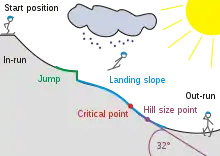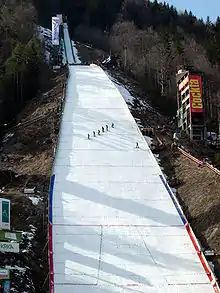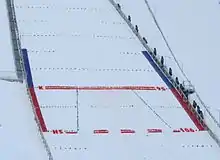Hill size
Hill size (HS) is a measurement for the size of a ski jumping hill. It is calculated based on the technical data of a hill based on radius, angle of inclination and record distance.[1] Since mid-2004, hill size became the official measurement for the size of hills, replacing construction points (also known as K-points, K-spots and critical points), which however remain the basis for issuing points.[2] The distance is measured as a straight line from the takeoff to the knoll, and then follows the landing surface until reaching the hill size point.[3] The world's largest hills are Vikersundbakken in Vikersund, Norway and Letalnica Bratov Gorišek in Planica, Slovenia with hill size of 240 meters. The hills normally mark the hill size physically with a horizontal line across the hill.



Classification
| Class | Construction point | Hill size[1] |
|---|---|---|
| Small hill | <45 | <50 |
| Medium hill | 45–74 | 50–84 |
| Normal hill | 75–99 | 85–109 |
| Large hill | 100–169 | 110–184 |
| Ski flying hill | ≥170 | ≥185 |
Nearly all competitions in the FIS Ski Jumping World Cup use large hills and ski-flying hills, with the largest being Mühlenkopfschanze in Germany. In addition, there is a bi-annual FIS Ski-Flying World Championships, which is held in one of the world's five ski flying hills: Vikersundbakken in Norway, Letalnica Bratov Gorišek in Slovenia, Čerťák in the Czech Republic, Heini Klopfer Ski Jump in Germany and Kulm in Austria. These all have a hill size of at least 185.[4] In the FIS Ski Jumping Continental Cup, and FIS Women's Ski Jumping Continental Cup, both normal and large hills are used. In the Winter Olympics, there is one competition in the normal hill, one in the large hill, and a team competition in the large hill.
References
- International Ski Federation. "Hill size". Archived from the original on 7 July 2011. Retrieved 11 February 2011.
- "Hoppbakkene bort fra K-punkt til HS-punkt" (in Norwegian). Norwegian News Agency. 29 June 2004.
- Eastern Ski Jumping & Nordic Combined Foundation. "Facts about Ski Jumping hills". Archived from the original on 17 March 2011. Retrieved 15 February 2011.
- International Ski Federation. "Ski flying". Archived from the original on 7 July 2011. Retrieved 11 February 2011.
